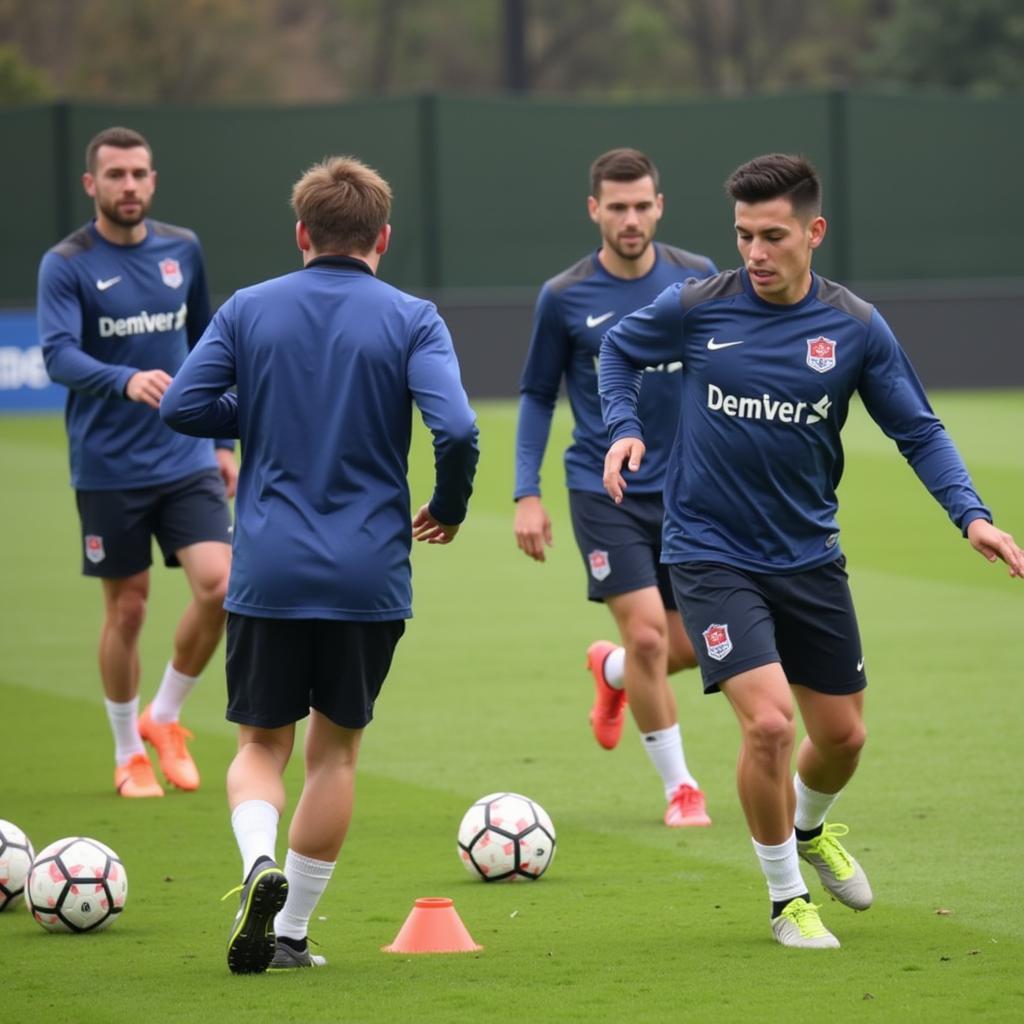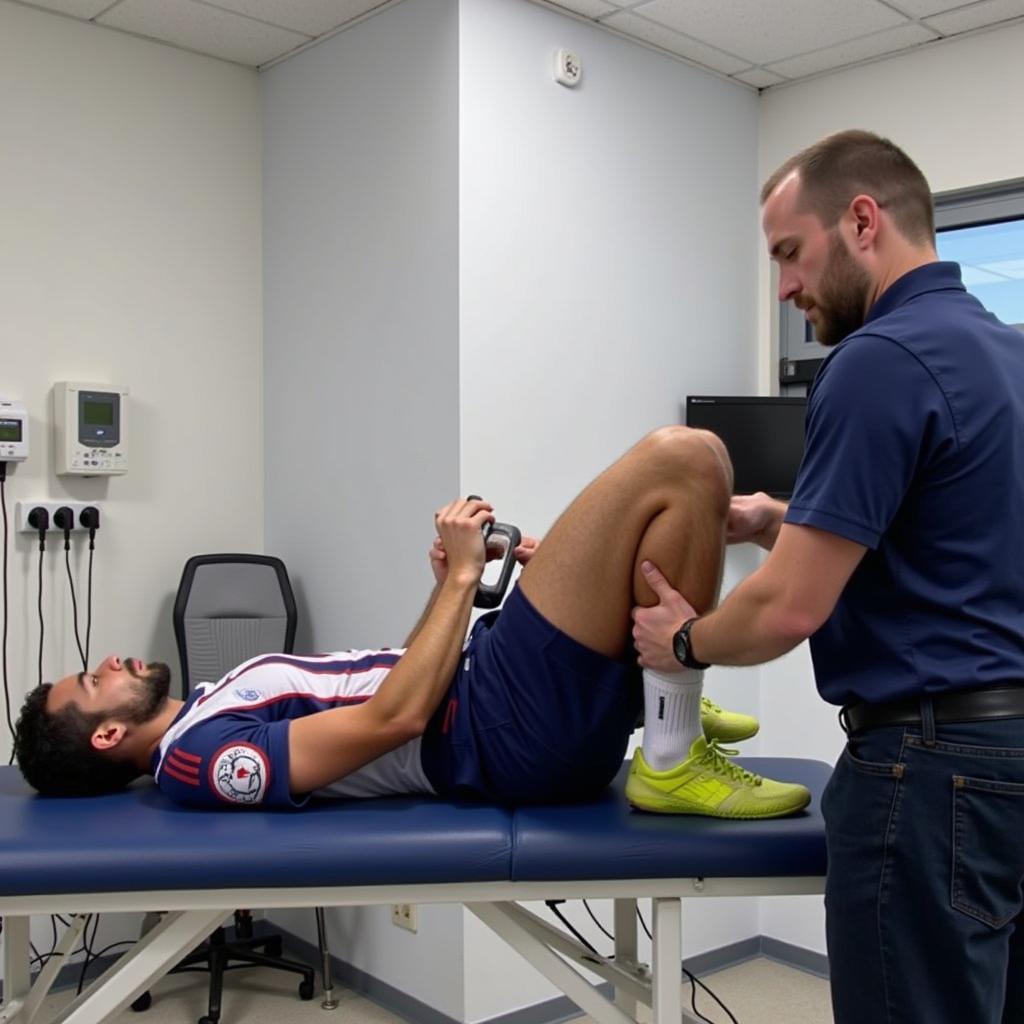Football Player Schedule: A Glimpse into the Life of a Pro
October 13, 2024The life of a professional footballer is often seen as glamorous, filled with roaring crowds, stunning goals, and lucrative endorsements. However, behind the scenes lies a meticulously planned schedule, a carefully crafted routine that ensures players are in peak physical and mental condition for the demanding season ahead. This “football player schedule” dictates everything from grueling training sessions to crucial recovery periods, all designed to optimize performance on the field.
The Building Blocks of a Football Player Schedule
A typical football player’s schedule is a complex puzzle with numerous interlocking pieces. While specifics may vary based on team strategy, individual player needs, and the time of year (pre-season, in-season, or off-season), the core components remain relatively consistent.
Training: Honing Skills and Building Strength
A significant portion of a player’s day is dedicated to training. This can be broken down into:
- Technical Training: Focusing on ball control, passing accuracy, shooting technique, and tactical awareness.
- Physical Training: Incorporating strength training, agility drills, plyometrics, and endurance exercises tailored to the specific demands of football.
- Tactical Sessions: Analyzing opponents, practicing set pieces, and refining team strategies through drills and video analysis.
 Players participating in a rigorous football training session
Players participating in a rigorous football training session
Recovery: Rest and Recharge
Recovery is not a luxury but a necessity in a footballer’s schedule. This includes:
- Sleep: Aiming for 8-10 hours of quality sleep each night to promote muscle recovery and hormone regulation.
- Nutrition: Following a carefully planned diet rich in lean proteins, complex carbohydrates, healthy fats, and essential vitamins and minerals to fuel workouts and aid recovery.
- Hydration: Maintaining optimal hydration levels throughout the day, especially before, during, and after training sessions.
- Active Recovery: Engaging in low-impact activities like swimming, cycling, or yoga to promote blood flow, reduce muscle soreness, and improve flexibility.
 A footballer undergoing physiotherapy in a professional setting
A footballer undergoing physiotherapy in a professional setting
Match Day: The Culmination of Hard Work
Match days are the peak of the week, where all the hard work and preparation culminate in 90 minutes (or more) of intense competition.
- Pre-Match Routine: Includes a light meal a few hours before kick-off, dynamic warm-up routines, and final tactical briefings.
- The Game: A test of skill, strategy, teamwork, and mental fortitude.
- Post-Match Recovery: Immediately after the final whistle, players focus on rehydrating, replenishing energy stores, and beginning the recovery process to prepare for the next challenge.
Navigating the Demands: A Balancing Act
Maintaining this rigorous schedule requires immense discipline, dedication, and a strong support system. Players often work with a team of professionals, including:
- Coaches: Providing tactical guidance, analyzing performance, and designing training programs.
- Physios and Doctors: Managing injuries, providing treatment and rehabilitation, and ensuring overall player health.
- Nutritionists: Developing personalized meal plans to optimize performance and recovery.
- Psychologists: Helping players develop mental resilience, manage pressure, and maintain focus.
Beyond the Pitch: The Bigger Picture
While the “football player schedule” revolves around optimizing performance, it’s important to remember that these athletes have lives beyond the pitch. They have families, hobbies, and commitments that require attention. Finding the right balance between their demanding careers and personal lives is crucial for their overall well-being and longevity in the sport.
FAQs about Football Player Schedules
1. How many hours a day do professional footballers train?
Professional footballers typically train for 4-6 hours per day, depending on the time of year and specific training demands.
2. Do football players train on match days?
Players usually have a light training session or tactical walk-through on match days, focusing on pre-match preparation rather than intense physical exertion.
3. What do football players do during the off-season?
The off-season is a time for rest and recovery, but players still maintain a certain level of fitness and may engage in light training to stay in shape. They also use this time to spend with family, pursue hobbies, and recharge before the next season begins.
4. How does a football player’s schedule change during pre-season?
Pre-season training is generally the most intense period, with a focus on building fitness, strength, and tactical understanding before the competitive season kicks off.
5. How can I find the specific match schedule for my favorite team or player?
You can find the most up-to-date match schedules on official league websites, team websites, and various sports news platforms.
Need More Information?
If you’re looking for more insights into the world of professional football, or need assistance with anything else, please don’t hesitate to reach out.
Contact us:
- Phone: 0396443476
- Email: [email protected]
- Address: 23 Tháng 3, Đắk Nia, Gia Nghĩa, Đắk Nông, Vietnam
Our dedicated team is available 24/7 to assist you.